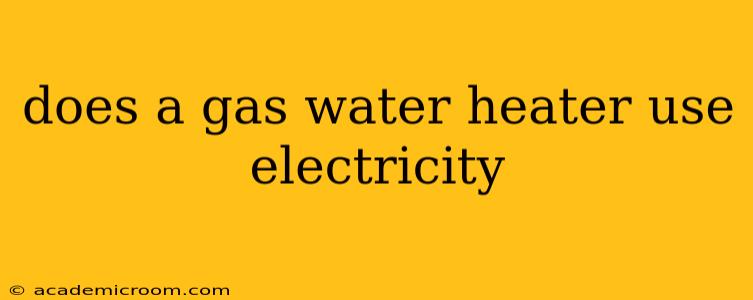Yes, even though gas water heaters primarily use natural gas or propane to heat water, they still require electricity for certain functions. While the actual heating process is fueled by gas, electricity plays a crucial role in several key aspects of the appliance's operation. This isn't a minor detail; understanding the electrical needs of your gas water heater is vital for troubleshooting and ensuring safe and efficient operation. Let's delve into the specifics.
What Electrical Components Does a Gas Water Heater Use?
A gas water heater employs electricity for several essential components:
-
Ignition System: Most modern gas water heaters utilize an electronic ignition system. This system uses electricity to create a spark that ignites the gas burner. Without electricity, the gas burner won't light, and you won't have hot water. This is a crucial function, and a malfunctioning ignition system is a common cause of water heater problems.
-
Electronic Controls: The control board within the water heater regulates the temperature, monitors the flame, and manages the overall operation of the unit. This sophisticated system relies on electricity to function correctly. Issues with the control board can lead to inconsistent hot water temperature or even complete failure.
-
Circulator Pump (in some models): Some tankless gas water heaters, and occasionally tank models with recirculation systems, include a circulator pump. This pump continuously circulates hot water through the pipes to minimize waiting time for hot water at the tap. This pump requires electricity to operate.
-
Display Panel (in some models): Many newer models feature a digital display panel showing the water temperature and other operational information. This panel requires a small amount of electricity.
How Much Electricity Does a Gas Water Heater Use?
The amount of electricity a gas water heater consumes is relatively small compared to its gas consumption. The exact amount varies depending on the model and features, but it's typically measured in watts and is usually a low-wattage draw. It's safe to say it's a minimal addition to your overall electricity bill, generally far less than that of an electric water heater.
What Happens If the Electricity Goes Out?
If the power goes out, your gas water heater will likely not be able to ignite the burner. You will need to re-light it manually when the electricity is restored. Note that this is dependent on the type of ignition system. Older models with a standing pilot light might still function, but most modern water heaters require the electronic ignition system.
Can I Run My Gas Water Heater on a Generator?
Yes, in most cases, you can run your gas water heater on a generator during a power outage, provided the generator is adequately sized to handle the relatively small electrical demand. Check your water heater's specifications for exact wattage requirements.
Why Does My Gas Water Heater Need Electricity?
The need for electricity in gas water heaters stems from the demand for safe, efficient, and automated operation. Modern features such as electronic ignition, temperature control, and safety shut-off mechanisms require electricity to ensure reliable hot water delivery while minimizing risk.
What if my gas water heater isn't working? Could it be an electrical issue?
If your gas water heater isn't working, an electrical problem could indeed be the cause. First, check that power is supplied to the unit. Look for tripped breakers or blown fuses. If the power supply is fine, the issue might be with the ignition system, control board, or other electrical components within the water heater. It's advisable to contact a qualified gas appliance technician for diagnosis and repair in this case. Attempting repairs yourself can be dangerous.
In conclusion, while gas provides the primary energy source for heating the water, your gas water heater relies on electricity for essential operational components. Understanding its electrical requirements is critical for proper maintenance and troubleshooting.
